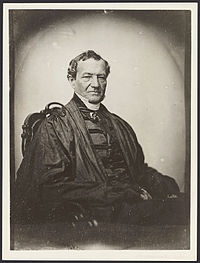Post Author: Bill Pratt
I recently read a short book entitled The Testimony of the Evangelists by Simon Greenleaf. Greenleaf was one of the most respected American jurists of the nineteenth century. He taught law at Harvard University and wrote a judicial classic, Treatise on the Law of Evidence. This work was used as a standard textbook for the latter half of the nineteenth century in American law schools.
The Testimony of the Evangelists is Greenleaf’s analysis of the four Gospels using the principles of legal evidence, an area in which he was an undisputed expert. Put simply, Greenleaf treated the Gospel writers’ testimonies as if they were being presented in a courtroom. How would they stand up?
In Greenleaf’s own words, “His business is that of a lawyer examining the testimony of witnesses by the rules of his profession, in order to ascertain whether, if they had thus testified on oath, in a court of justice, they would be entitled to credit and whether their narratives, as we now have them, would be received as ancient documents, coming from the proper custody.”
Greenleaf systematically applied the rules of evidence to the Gospel writers and found them to be entirely credible. How did he do so? He first argued that the documents themselves, as originally composed 2,000 years ago and reproduced from that time down to the present day, met the legal standards of admission in a court of law. He then explained the kind of evidence needed to show that the authors of the documents were trustworthy in their testimony.
It is universally admitted that the credit to be given to witnesses depends chiefly on their ability to discern and comprehend what was before them, their opportunities for observation, the degree of accuracy with which they are accustomed to mark passing events and their integrity in relating them.
After careful historical analysis, Greenleaf finds that each Gospel writer meets these criteria, and thus their testimony about the life, death, and resurrection of Jesus should be judged true, based on the canons of legal evidence.
Some skeptics have charged that the standards for judging the truthfulness of the Gospel accounts should be much higher than the canons of legal evidence. We will examine Greenleaf’s response to this challenge in part 2 of this post.